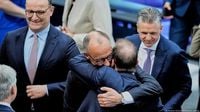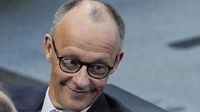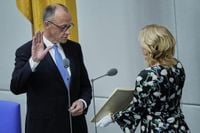In a dramatic turn of events, Friedrich Merz has been elected as Germany's new chancellor on May 6, 2025, following an unprecedented first-round defeat that had many questioning the stability of his coalition government. Merz's initial failure to secure a majority in the Bundestag marks a historic moment, as no other postwar candidate has faced such a setback in the first ballot.
The first round of voting saw Merz receiving only 310 votes, far short of the 328 seats held by his coalition. This unexpected outcome sent shockwaves through Europe and resulted in a 1.8% drop in the DAX, Germany's stock market index. However, Merz rebounded in the second round, garnering 325 votes—just enough to surpass the 316 required to take office.
In his first speech after being sworn in, Merz expressed gratitude for his election, stating, “So here we go. I am looking forward to the new task, and I am looking forward to working with you all in this house in a spirit of trust.” His coalition, which includes the center-right Christian Democratic Union (CDU) and the Social Democrats (SPD), aims to revive Germany's stagnant economy and address the rise of the far-right, anti-immigrant Alternative for Germany (AfD) party.
Merz's ascension to chancellorship comes at a pivotal time, coinciding with the 80th anniversary of Nazi Germany's unconditional surrender in World War II. The restored Reichstag building, where the voting took place, serves as a poignant reminder of Germany's past. The shadow of the ongoing war in Ukraine also looms large, as Germany is the second-largest supplier of military aid to Ukraine, following the United States.
Ukrainian President Volodymyr Zelenskyy welcomed Merz's victory, emphasizing the need for stronger European leadership in light of the current geopolitical climate. “Ukraine is deeply grateful for the support of Germany and its people,” Zelenskyy stated in a message posted on social media. He urged Germany to take a more active role in European and transatlantic affairs.
Merz's election has also drawn international attention. Chinese President Xi Jinping congratulated him, highlighting the importance of deepening cooperation between China and Germany, the world's second- and third-largest economies. Xi's statement, reported by state media, emphasized the need for both nations to promote economic globalization.
As Merz prepares to navigate the complexities of leadership, he faces significant challenges. His coalition has pledged to tackle illegal migration and assert Germany's leadership in Europe, especially in response to threats from the east. According to Volker Resing, Merz's biographer, the new chancellor must now focus on the day-to-day business of governance and work to restore confidence in his administration.
Despite the rocky start, political analysts suggest that Merz's initial defeat could serve as a valuable lesson in humility, urging him to engage more collaboratively with his coalition partners. The new chancellor is expected to embark on his first diplomatic trips to Paris and Warsaw, aiming to solidify the Paris-Berlin-Warsaw axis, known as the Weimar Triangle, to address shared challenges.
On the domestic front, Merz's cabinet has officially been appointed, with key figures including Vice Chancellor Lars Klingbeil (SPD) and Foreign Minister Johann Wadephul (CDU). Merz's administration faces scrutiny over its approach to the AfD, which has been classified as a “right-wing extremist” organization by Germany's domestic intelligence service. This classification has drawn criticism from U.S. officials, including Secretary of State Marco Rubio, who urged Germany to reconsider its stance.
Merz has stated his intention to speak with former President Donald Trump regarding the U.S. administration's comments on Germany's political landscape. He emphasized the importance of keeping U.S. politics separate from German affairs while acknowledging the complex relationship between the two nations.
As the new government settles in, Merz's leadership will be closely monitored by both domestic and international observers. His ability to deliver on ambitious promises will be crucial in determining the future of Germany and its role in Europe. The new chancellor's commitment to uphold international law and humanitarian obligations, particularly concerning the conflict in Gaza, reflects a nuanced approach to foreign policy.
With the world watching, Friedrich Merz's chancellorship begins under the weight of history and expectation. His administration will need to navigate a rapidly changing geopolitical landscape while addressing pressing domestic issues. As he embarks on this journey, the hope is that Merz can steer Germany toward a path of stability and renewed leadership on the European stage.







